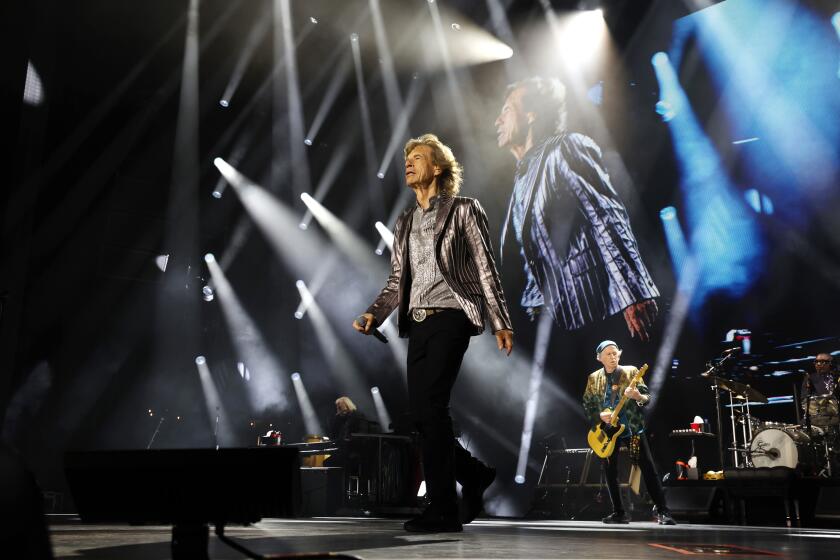Angélique Kidjo brings African experiences to her craft
The term clanked off Angélique Kidjo’s ear when she first heard it. “African American.” How could someone be American and African at the same time, she wondered?
“You think I’m stupid because I’m a little girl?” Kidjo asked the person who’d used the expression. She was 9 years old.
Speaking by phone recently, the Benin-born Afro-pop diva, who will make her Walt Disney Concert Hall debut with her four-piece band on Sunday night, laughed at the memory. In the years that followed, Kidjo would learn from her grandmother about slavery’s legacy and the strange cultural fruit that it yielded. Through her father’s influence, she would cultivate an appreciation for Nat “King” Cole, Aretha Franklin and other iconic African American artists.
Later, when she started performing and recording, Kidjo would re-interpret some of these artists’ songs, and interpolate the rhythms and textures of American jazz, R&B and funk into her own music.
That decades-long process has reached a kind of personal apotheosis for the Grammy Award-winning singer with this month’s release of her latest record, “Oyo” (Razor & Tie). Named for an indigenous West African word that translates as “beauty of the people,” the disc pays tribute to Kidjo’s U.S. African American inspirations, and to another formative influence, Bollywood movies, which she grew up watching.
“I always go to Indian movies and they always have happy endings,” she said. “The dancing, the costumes, the song, it’s hot.”
Like Kidjo’s previous record, “Djin Djin,” her new release is built around collaboration. She joins Bono and John Legend on a polyrhythmic jam of Curtis Mayfield’s “Move on Up, and teams up with Diane Reeves on the Aretha Franklin hit “Baby I Love You.”
Kidjo, who fluently speaks and sings in Yoruba, Fon, French and English, merges a Yoruban chorus with the gospel-tinged euphoria of Otis Redding’s “I’ve Got Dreams to Remember.” On a cover of Santana’s “Samba Pa’ Ti,” she receives a chilled-out solo assist from jazz trumpeter Roy Hargrove.
When it’s not evoking ‘70s soul or Mumbai’s movie industry, “Oyo” returns to Kidjo’s native soil. The exquisitely soothing “Lakutshn Llanga” is a traditional lullaby brought to prominence by Miriam Makeba, one of Kidjo’s artistic touchstones.
Like many of her educated, middle-class countrymen, Kidjo was driven into exile in the early 1980s, when an autocratic Marxist government ruled Benin. She made Paris her home, and her rise as an Afropop-fusion star owes much to her solid European and North American fan base.
But her connection to the ubiquity of music in West African culture remains.
“Music isn’t a business there, it’s a daily life,” she said approvingly. “You put your instrument out and you play.” The downside of that, she added, is that, “there’s no status for artists there.”
The new disc’s most singular presence isn’t a fellow star performer. It’s Kidjo’s father, a musician who died last year, and who inculcated his love of music and musicians in his daughter. Among the record’s offerings are “Dil Main Chuppa Ke Pyar Ka,” from a Bollywood film that Kidjo and her dad reportedly saw together over and over, and “Petite Fleur,” a Sidney Bechet tune that was among her father’s favorites.
“Suddenly I realized he’s no longer going to be there, to talk about the memory of this song or that song,” Kidjo said. “I was struggling with my grief and once again I turned to music to find my comfort, as I have always done in my life. The way to get on with my grief is to use the music he gave me.”
When Kidjo started performing, she said, her father and family always supported her. That was no small act of courage in a country where female musicians were, and to an extent still are, viewed with suspicion, contempt or worse, she said. “When you’re a girl and you play music with what they call ‘evil’ instrument, they call you a prostitute.”
Exploring and celebrating the ties that bind Africans with their musical cousins in the Western Hemisphere will be one of Kidjo’s objectives Sunday night. Another is encouraging her audiences to let the musical spirit move them however it will.
Translation: Disney Hall patrons better be ready to boogie in the aisles.
“I’m not playing for walls,” Kidjo said, “and I come from a country where everybody participates. So if you come to a concert, you have to participate.”
reed.johnson@latimes
.com
More to Read
The biggest entertainment stories
Get our big stories about Hollywood, film, television, music, arts, culture and more right in your inbox as soon as they publish.
You may occasionally receive promotional content from the Los Angeles Times.







